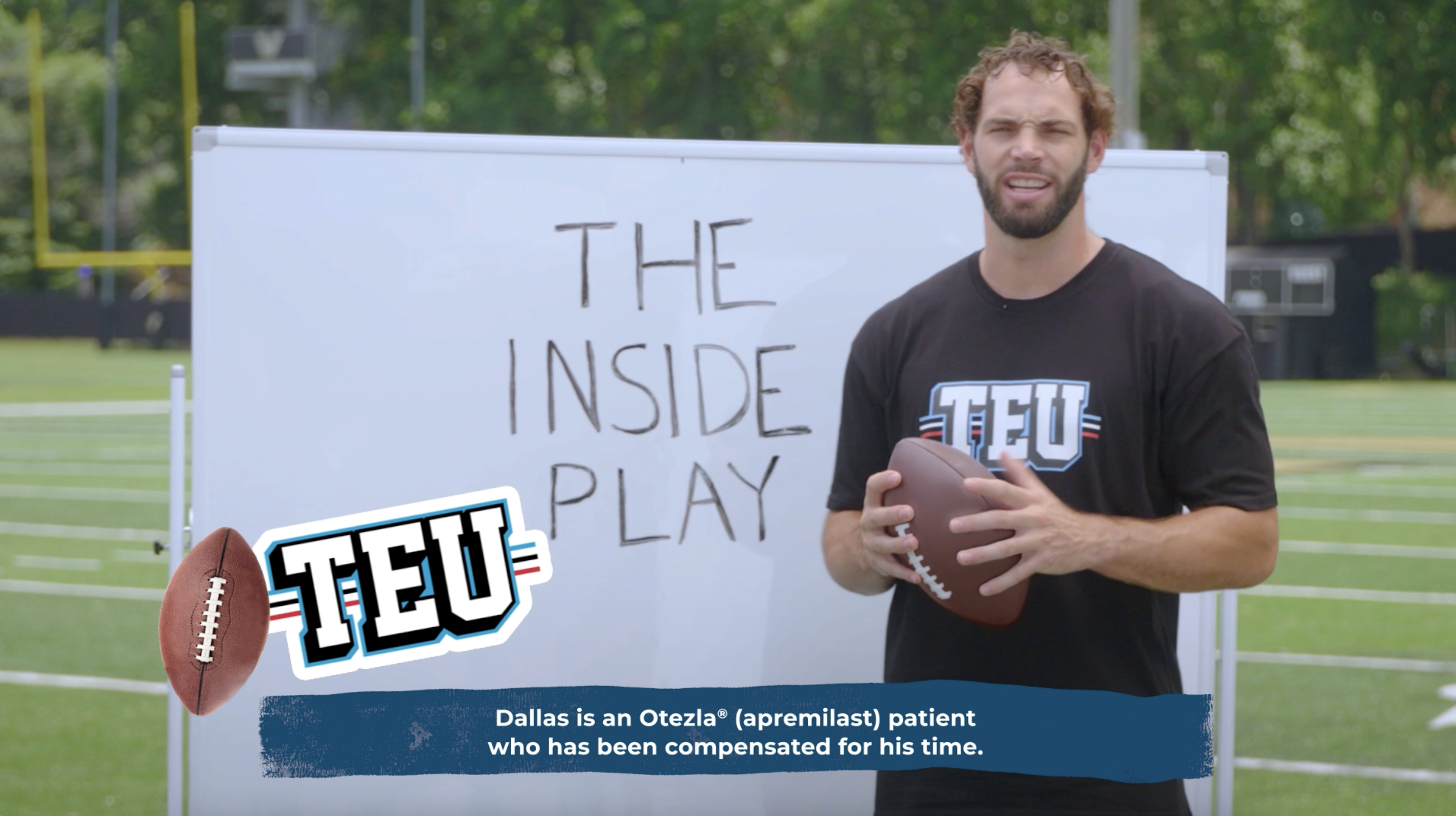Active Psoriatic Arthritis:
Active Psoriatic Arthritis:
Plaque Psoriasis:
Oral Ulcers Associated with Behçet’s Disease:
From diagnosis to covering up, to topical trial and error, see how Dallas worked with his doctor to find a treatment that works for him.
Having a plaque on your body made it hard to fully just be a kid. Kids can be mean sometimes, they point it out. It made me feel a little embarrassed.”

My skin would get red, flaky, and itchy, and I would worry about people seeing it. I’d go to school every day in a long-sleeve, whether it was hot or cold, just to hide my skin.”

Topicals were tough for me, due to the consistency required as well as the staining on my jersey. It was also hard making sure I was getting them on hard to reach places, like my back, for long enough to see results.”

Dallas is a professional football player who has been covering his plaque psoriasis on and off the field. After years of cycling on topicals, Dallas decided to have a conversation with his doctor about a different treatment option. They talked about tackling plaque psoriasis from the inside out and not just on the surface with a pill, Otezla. Dallas is excited to be on a treatment for his plaque psoriasis that fits his lifestyle as a professional athlete.
Dallas Goedert, Pro Football Champion and Otezla patient, shows two Fox Sports Radio hosts, Covino and Rich, what it’s like to be a pro football player with plaque psoriasis. Covino and Rich compete to see if they can beat Dallas’ football stats while putting up with some distractions—just like Dallas can experience with his plaque psoriasis. His struggle with the condition is one of the many obstacles he’s had to face throughout his career. Now, Dallas treats his plaque psoriasis with Otezla—he has clearer skin after 4 months and thinks less about distracting itchy, flaky plaques.
Professional football champion Dallas reflects on his plaque psoriasis journey one year after starting treatment with Otezla. After years of being challenged with applying topicals in hard-to-treat areas, Dallas talked with his doctor about a different approach—treating plaque psoriasis from the inside out, not just on the surface, with a pill: Otezla. Now, after being on treatment for over 4 months, Dallas is seeing results. His skin is now clearer with less redness, itching, and flaking, and he’s on a treatment that fits into his routine both on and off the field.
Dallas is on the field at Tight End University and giving us a taste of what it is like to tackle his opponents on and off the field. He even let us in on a little secret: he tackles his plaque psoriasis on the inside by treating inflammation where it starts with a pill, Otezla.* Dallas now has clearer skin from plaque psoriasis after being on treatment for over 4 months, even in difficult to treat areas.
*The exact way in which Otezla helps improve symptoms isn’t completely understood.






Ready to see clearer skin after just 4 months?

Dallas Goedert, Pro Football Champion and Otezla Patient, shows two Fox Sports Radio hosts, Covino and Rich, what it’s like to be a pro football player with plaque psoriasis. Covino and Rich compete to see if they can beat Dallas’ football stats while putting up with some distractions – just like Dallas can experience with his plaque psoriasis. His struggle with the condition is one of the many obstacles he’s had to face throughout his career. Now, Dallas treats his plaque psoriasis with Otezla – he has clearer skin after 4 months and thinks less about distracting itchy, flaky plaques.
Your results may vary.
Your results may vary
Do not take Otezla 30 mg tablets or Otezla XR 75 mg extended-release tablets if you are allergic to apremilast or to any of the ingredients in Otezla/Otezla XR
Otezla/Otezla XR can cause serious side effects, including:
Some medicines may make Otezla/Otezla XR less effective and should not be taken with Otezla/Otezla XR. Tell your doctor about all the medicines you take, including prescription and non-prescription medicines.
The most common side effects include diarrhea, nausea, upper respiratory tract infection, tension headache, and headache. These are not all the possible side effects with Otezla/Otezla XR. Ask your doctor about other potential side effects. Tell your doctor about any side effect that bothers you or does not go away.
Tell your doctor if you are pregnant, planning to become pregnant or planning to breastfeed.
You are encouraged to report negative side effects of prescription drugs to the FDA. Visit www.fda.gov/medwatch, or call 1-800-332-1088.
Please click here for the Full Prescribing Information for Otezla/Otezla XR.
Prescription Otezla® /Otezla XRTM (apremilast) is used for the treatment of:
Active Psoriatic Arthritis:
Plaque Psoriasis:
Oral Ulcers Associated with Behçet’s Disease:
Do not take Otezla 30 mg tablets or Otezla XR 75 mg extended-release tablets if you are allergic to apremilast or to any of the ingredients in Otezla/Otezla XR.
Otezla/Otezla XR can cause serious side effects, including: